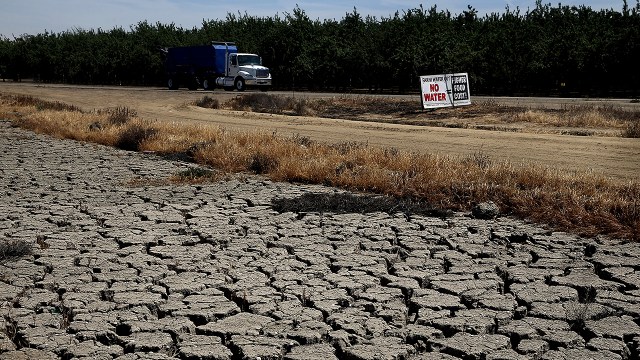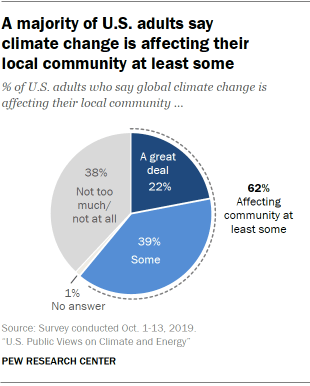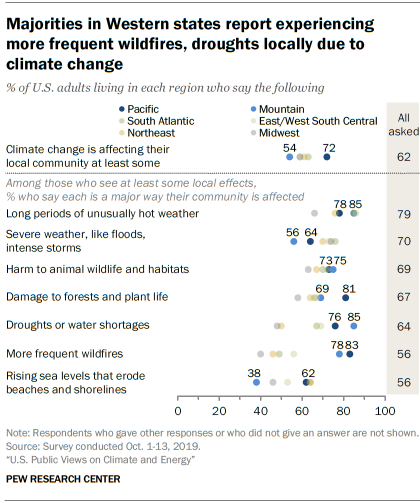
Roughly six-in-ten U.S. adults (62%) say climate change is currently affecting their local community either a great deal or some, according to a new Pew Research Center survey. This finding is consistent with a 2018 Center survey, in which 59% of Americans said global climate change was affecting their local community at least some.
 As is the case on many climate change questions, perceptions of climate change effects in one’s local community are closely tied with political party affiliation. About eight-in-ten Democrats (82%, including those who lean to the Democratic Party) say climate change is affecting their local community at least some, while about half as many Republicans say this (38%, including leaners).
As is the case on many climate change questions, perceptions of climate change effects in one’s local community are closely tied with political party affiliation. About eight-in-ten Democrats (82%, including those who lean to the Democratic Party) say climate change is affecting their local community at least some, while about half as many Republicans say this (38%, including leaners).
But politics is not the only factor related to these views. Americans’ beliefs about the overall effect of climate change on their local community vary by geographic region. Around seven-in-ten Americans living in the Pacific region (72% in California, Washington, Oregon, Hawaii and Alaska) report at least some effect of climate change in their local community. In contrast, 54% of those living in Mountain states (Arizona, Colorado, Nevada, Utah, New Mexico, Idaho, Montana and Wyoming) say the same. Although the share of Democrats living in the Pacific region is higher than the share living in Mountain states, Pacific residents remain significantly more likely than those in the Mountain region to say they see climate change effects locally, even after controlling for party.
Americans living in close proximity to a coastline are modestly more likely to report climate change is affecting their local community. Two-thirds of Americans who live within 25 miles of a coastline (67%) say climate change is affecting their local community at least some. In comparison, 59% of those who live 300 miles or more from the coast say the same.
 In the new survey, the Center also asked those who said climate change is affecting their local community to identify major ways their local area has been affected. About eight-in-ten of this group (79%, which represents 49% of all U.S. adults) say long periods of unusually hot weather are a major effect. And around seven-in-ten of those who see climate effects in their community cite severe weather (70%), harm to animal wildlife and their habitats (69%) or damage to forests and plant life (67%) as major effects. Equal shares (56%) say more frequent wildfires or rising sea levels that erode beaches and shorelines have been major effects locally.
In the new survey, the Center also asked those who said climate change is affecting their local community to identify major ways their local area has been affected. About eight-in-ten of this group (79%, which represents 49% of all U.S. adults) say long periods of unusually hot weather are a major effect. And around seven-in-ten of those who see climate effects in their community cite severe weather (70%), harm to animal wildlife and their habitats (69%) or damage to forests and plant life (67%) as major effects. Equal shares (56%) say more frequent wildfires or rising sea levels that erode beaches and shorelines have been major effects locally.
Although majorities of Americans across regions who say they see at least some local impact of climate change cite long periods of hot weather as a major effect, responses vary widely by region when it comes to other kinds of environmental impacts.
As areas in the Pacific and Mountain regions have gotten hotter and drier, the length of the fire season and the sizes of fires have grown. Americans living in the Pacific and Mountain regions stand out as especially likely to point to frequent wildfires along with drought or water shortages as major effects. Among those who say they see local impacts of climate change in their community, 83% of Pacific region and 78% of Mountain region residents say increasing wildfire activity is a major effect. This compares with about half or fewer of those living in the Southern (52%), Northeastern (46%) or Midwestern (40%) regions of the United States who say the same.
Another difference in perceptions of local climate change effects emerges between regions with differing sizes of coastline. Among those who see climate change effects locally, majorities of residents in Northeastern (64%), South Atlantic (64%) and Pacific states (62%) – regions with significant lengths of coastline – cite rising sea levels that erode beaches and shorelines as a major local effect. (The South Atlantic region includes Florida, North Carolina, Georgia, Virginia, Maryland, South Carolina, West Virginia, Delaware and the District of Columbia.) In comparison, 46% of those asked in the Midwest and 38% in Mountain states cite this as a major effect.
Similarly, those living within 25 miles of a coast are especially likely to cite rising sea levels as a major climate change impact. Among those living close to a coast who see at least some local effects of climate change, about seven-in-ten (72%) say this, compared with fewer than half of those who live at least 300 miles inland and see at least some effects of climate change locally (45%).
Note: See full topline results and methodology.



